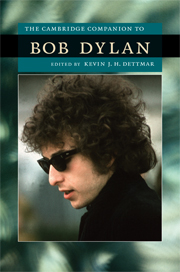Book contents
- Frontmatter
- Introduction
- Part I Perspectives
- 1 Bob Dylan and the Anglo-American tradition
- 2 Bob Dylan and Rolling Thunder
- 3 Bob Dylan as songwriter
- 4 Bob Dylan as performer
- 5 Bob Dylan and collaboration
- 6 Bob Dylan and gender politics
- 7 Bob Dylan and religion
- 8 Bob Dylan and the Academy
- 9 Bob Dylan as cultural icon
- Part II Landmark Albums
- Works cited
- Index
8 - Bob Dylan and the Academy
from Part I - Perspectives
Published online by Cambridge University Press: 28 May 2009
- Frontmatter
- Introduction
- Part I Perspectives
- 1 Bob Dylan and the Anglo-American tradition
- 2 Bob Dylan and Rolling Thunder
- 3 Bob Dylan as songwriter
- 4 Bob Dylan as performer
- 5 Bob Dylan and collaboration
- 6 Bob Dylan and gender politics
- 7 Bob Dylan and religion
- 8 Bob Dylan and the Academy
- 9 Bob Dylan as cultural icon
- Part II Landmark Albums
- Works cited
- Index
Summary
On June 9, 1970, Bob Dylan took to the stage once more. This time, however, it was not to sing but rather to be awarded an honorary doctorate by Princeton University. Four months later, Dylan released a song documenting that day entitled “Day of the Locusts. #8221; “Darkness was everywhere, it smelled like a tomb” he sings, before concluding “Sure was glad to get out of there alive.” Over thirty years later, in his autobiography, Dylan revisited his experience of that event. While the discomfort of the occasion is still vivid in Dylan's writing, he also suggests that he accepted the doctorate in order to undermine his countercultural credibility; “every look and touch and scent of [the degree] spelled respectability” (Chronicles: Volume One 134). This ambivalent mixture of attraction and repulsion has characterized Dylan's attitude to those who study him since the 1960s. While he has repeatedly scorned those who seek to analyze him and categorize him, most scathingly in the withering putdown of Mister Jones in “Ballad of a Thin Man,” it also seems likely that he is proud of his status as rock's most analyzed songwriter. Indeed, Dylan's management are rather generous in their granting of copyright permissions to aspirant authors, but there is always a requirement that a copy of any completed book be sent to Dylan's office to take its place among the vast library of work now completed on him. It seems that Dylan is rather interested in what people say about him. This ambivalence works both ways. It would be wrong to suggest that Dylan has been wholeheartedly endorsed by the Academy; as my own experience of writing a book on Dylan attests, even today there is still skepticism generated by the medium in which he works.
- Type
- Chapter
- Information
- The Cambridge Companion to Bob Dylan , pp. 100 - 109Publisher: Cambridge University PressPrint publication year: 2009
- 5
- Cited by



